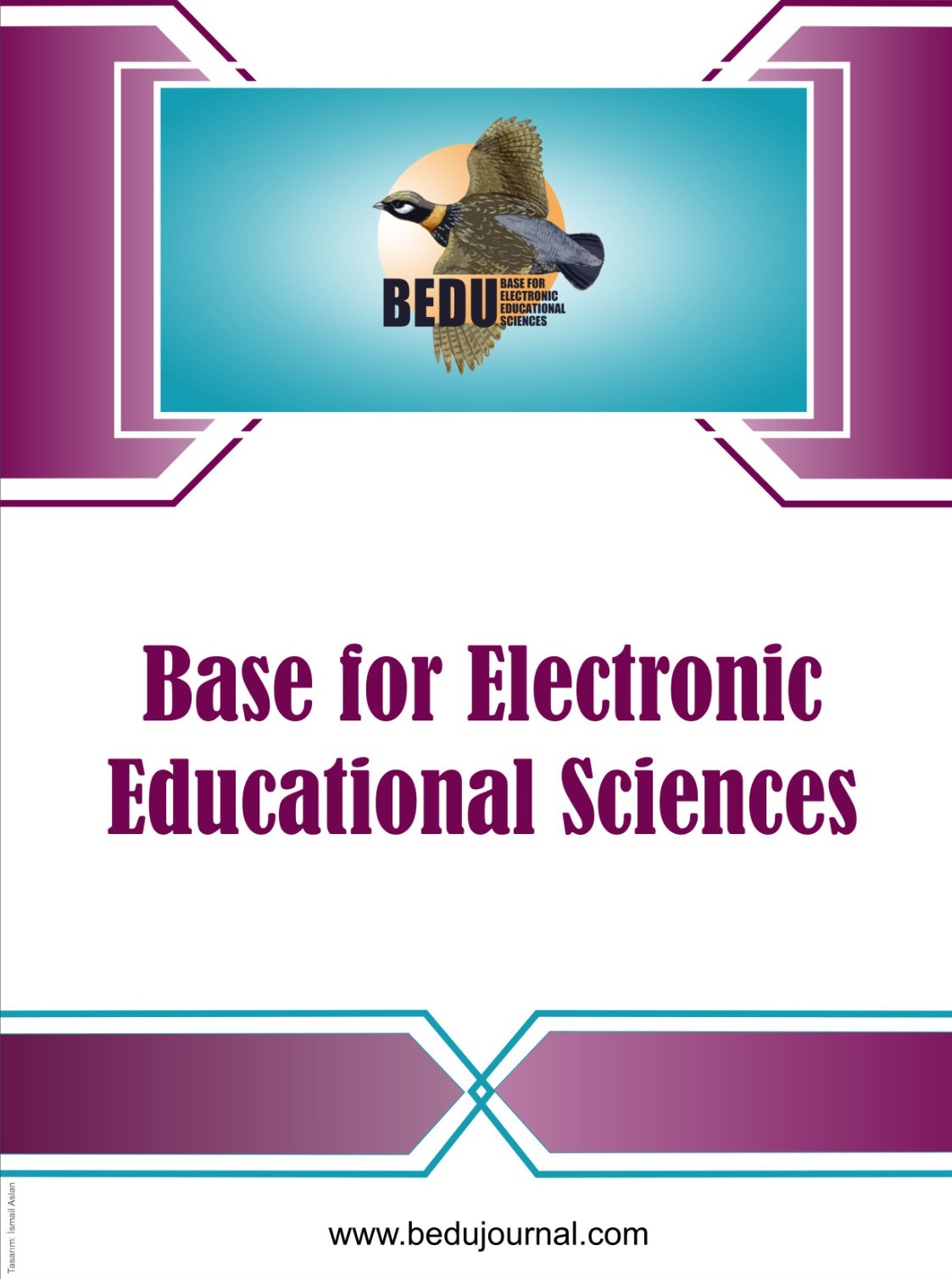Research article | Open Access
Base for Electronic Educational Sciences 2024, Vol. 5(2) 133-152
Expert Opinions on the Effect of Grammar Teaching on Oral Expression Skills
pp. 133 - 152 | DOI: https://doi.org/10.29329/bedu.2024.1064.8
Publish Date: September 29, 2024 | Single/Total View: 112/197 | Single/Total Download: 154/220
Abstract
Grammar teaching has been one of the controversial issues in both Turkish education and mother tongue education in other countries from past to present in terms of its necessity and teaching method. In this study, the effectiveness of grammar teaching on speaking, one of the four basic language skills, was examined by taking the opinions of theatre actors, presenters, politicians, teachers and academicians. The aim of this research is to give a different perspective to the literature on the role of grammar in Turkish education by taking the opinions of professional groups (theater actors, presenters, politicians, teachers and academicians) who are competent in speaking skills on the effect of grammar teaching on speaking skills. Considering that theatre actors, presenters and politicians are among the professional groups that use spoken language most effectively, it is of great importance to examine the opinions of these professional groups on the effect of grammar teaching on speaking skills. In addition, Turkish education 5,6,7 and 8. The opinions of the Turkish teachers working in the Ministry of National Education, who carried out direct communication in the classrooms with the students, and the field academicians who examined and researched Turkish education and grammar teaching at the academic level were also obtained. This study is valuable in terms of obtaining and comparing the views of five different occupational groups, each of which is likely to look at the issue from a different perspective and each of which is relevant to the issue from different aspects. The design of the research created with the qualitative research method is the case study. A semi-structured interview form was used to collect the data, and content analysis was used to analyze the data. It is a descriptive study. According to the expert opinions analyzed, while the presenters saw the highest effect on the speech dimensions of grammar lessons, academicians and teachers stated lower effects on this subject. As a result of the research, it was concluded that mother tongue education in schools is far from gaining many skills and habits aimed at gaining.
Keywords: Grammar, Turkish education, Grammar teaching, Oral expression, Speaking
APA 7th edition
Yasar, A.C., Turkel, A., & Oz, K. (2024). Expert Opinions on the Effect of Grammar Teaching on Oral Expression Skills. Base for Electronic Educational Sciences, 5(2), 133-152. https://doi.org/10.29329/bedu.2024.1064.8
Harvard
Yasar, A., Turkel, A. and Oz, K. (2024). Expert Opinions on the Effect of Grammar Teaching on Oral Expression Skills. Base for Electronic Educational Sciences, 5(2), pp. 133-152.
Chicago 16th edition
Yasar, Ayce Cansu, Ali Turkel and Koray Oz (2024). "Expert Opinions on the Effect of Grammar Teaching on Oral Expression Skills". Base for Electronic Educational Sciences 5 (2):133-152. https://doi.org/10.29329/bedu.2024.1064.8
Aydın, Ö. (1999). Orta okullarda dil bilgisi öğretimi üzerine öğretmen görüşleri. Dil Dergisi, 81, 23-29.
Braddock, R., Llody-Jones, R. ve Schoer, L. (1963). Research in written composition. National Council of Teachers of English: NCTE.
Çeçen, M. A. ve Mete, G. (2011). 6-8. sınıflarda dil bilgisi etkinliklerine ilişkin öğretmen görüşleri. Dicle Üniversitesi Sosyal Bilimler Enstitüsü Dergisi, 5, 47-62.
Dolunay, S. K. (2010). Dil bilgisi öğretiminin amacı ve önemi. Türklük Bilimi Araştırmaları, 27, 275-284.
Erdem, İ. (2008). Öğretmen görüşlerine göre dil bilgisi konularının öğretilme güçlükleri. Türk Eğitim Bilimleri Dergisi, 6(1), 85-105.
Falkingham, L. T. ve Reeves, R. (1998). Context analysis- a technique for analysing research in a fi eld, applied to literature on the management of R and D at the section level. Scientometrics, 42(2), 97-120.
Gece, M. (1993). Türkçe sözdiziminin temel mantığı. Ondokuz Mayıs Üniversitesi Eğitim Fakültesi Dergisi, 8(1), 97-104.
Göçer, A. ve Arslan, S. (2019). Ortaokulda gerçekleştirilen dil bilgisi öğretimi durumunun öğretmen görüşlerine göre değerlendirilmesi. Iğdır Üniversitesi Sosyal Bilimler Dergisi, 18, 297-326.
Göğüş, B. (1978). Orta dereceli okullarımızda Türkçe ve yazın eğitimi. Gül Yayınevi.
Güneş, F. (2013). Yapılandırıcı yaklaşımla dil bilgisi öğretimi. Eğitimde Kuram ve Uygulama, 9(3), 171 -187.
Güven, A. Z. (2013). Dil bilgisi konularının öğretim sorunları. Dil ve Edebiyat Eğitimi Dergisi, 2(6), 1-10.
Hancock, D. R. ve Algozzine, B. (2006). Doing case study research. Teachers Collage Press.
Harris, R J. (1962). An experimental inquiry into the functions and value of formal grammar in the teaching of English, with special reference to the teaching of correct written English to children aged 12 to 14. [Unpublished doctorate thesis]. University of London.
İşcan, A. ve Kolukısa, H. (2005). İlköğretim ikinci kademe dil bilgisi öğretiminin durumu, sorunları ve çözüm önerileri. Atatürk Üniversitesi Sosyal Bilimler Enstitüsü Dergisi, 5(1), 299-308.
Karataş, Z. (2015). Sosyal bilimlerde nitel araştırma yöntemleri. Manevi Temelli Sosyal Hizmet Araştırmaları Dergisi, 1(1), 62-80.
Le Guin, U. K. ve Naimon, D. (2020). Yazma üzerine sohbetler (Ö. D. Gürkan, Çev.; 1. b.). Metis Yayınları. (Orijinal eserin yayın tarihi 2018)
May, R. (2001). Yaratma cesareti (A. Oysal, Çev.; 7. Baskı). Metis Yayınları. (Orijinal eserin yayın tarihi 1975)
Miles, M, B., & Huberman, A. M. (1994). Qualitative data analysis: An expanded Sourcebook. (2nd ed). Thousand Oaks, CA: Sage.
Salman, B. ve Aydın, İ. S. (2018). Yapılandırmacı yaklaşıma göre dil bilgisi öğretimine yönelik öğretmen görüşleri. Turkish Studies, 13(27), 1265-1284. http://dx.doi.org/10.7827/TurkishStudies.14304
Temizkan, M. (2010). Türkçe öğretiminde yaratıcı yazma becerilerinin geliştirilmesi. Türklük Bilimi Araştırmaları, 27, 621-643.
Yin, R. K., (1994). Case Study Research Design and Methods: Applied Social Research and Methods Series. Second edn. Thousand Oaks, CA: Sage Publications Inc.
